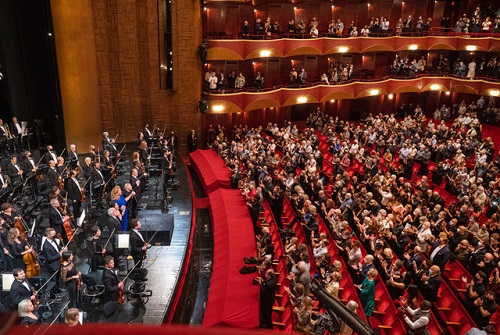 United States Verdi’s Requiem – The Met Remembers 9/11: Ailyn Pérez (soprano), Michelle DeYoung (mezzo-soprano), Matthew Polenzani (tenor), Eric Owens (bass-baritone), Metropolitan Opera Chorus & Orchestra / Yannick Nézet-Séguin (conductor). Metropolitan Opera, New York, 11.9.2021. (RP)
United States Verdi’s Requiem – The Met Remembers 9/11: Ailyn Pérez (soprano), Michelle DeYoung (mezzo-soprano), Matthew Polenzani (tenor), Eric Owens (bass-baritone), Metropolitan Opera Chorus & Orchestra / Yannick Nézet-Séguin (conductor). Metropolitan Opera, New York, 11.9.2021. (RP)

The Metropolitan Opera observed the twentieth anniversary of 9/11 with a Verdi Requiem that resonated far beyond its walls. Earlier in September, the Met Orchestra and Chorus gave two outdoor performances of Mahler’s Resurrection Symphony with soprano Ying Fang and mezzo-soprano Denyse Graves, conducted by the company’s music director, Yannick Nézet-Séguin. The Verdi concert came almost eighteen months to the day after the Metropolitan Opera went dark at the beginning of the pandemic, and it was the first performance inside the house, let alone with a live audience.
Five hundred free tickets were given to the families of 9/11 victims. The rest were offered for $25 and sold out immediately. The concert was broadcast live on PBS as part of its Great Performances series (social media was abuzz that the transmission cut away in the final moments of the performance), and there was live audio available for the public in Lincoln Center Plaza, with the gist of the text projected onto the facade of the Met.
For close to 45 years, I have only heard the Met live inside the opera house or in concert at Carnegie Hall. This time, I was out on the plaza, and it was a fine place to be on this balmy September evening.
For those of us who witnessed the terrorist attacks on the World Trade Center on 9/11, the morning’s azure skies are forever imprinted in our memories. Six months after that terrible day, there was the first Tribute in Light in which New York buildings were lit in blue from dusk to dawn. The tradition has continued every year since, and on this evening Lincoln Center’s theaters were awash in blue.

The prolonged applause that greeted the Met’s chorus and orchestra ricocheted off the buildings, as did the shorter but equally enthusiastic welcomes for soloists and conductor. Sound quality was surprisingly good. It should come as no surprise that the loud parts provided the most visceral thrills. The bass drums in the ‘Dies irae’ sounded like cannon balls exploding, and the trumpet fanfares announcing the call to judgement in ‘Tuba mirum’ sliced through the air.
Nonetheless, softer passages – such as the chorus in the opening prayer beseeching that the departed be granted eternal rest and bathed in perpetual light – were extremely moving.
The soloists’ voices were dulled by amplification but made an impact nonetheless. Tenor Matthew Polenzani sang a sweet, lyrical ‘Ingemisco’, while bass-baritone Eric Owens’s stentorian voice made a profound impression. Soprano Ailyn Pérez floated some astounding high notes, and the concluding ‘Libera me’ was electrifying, but mezzo-soprano Michelle DeYoung with her exciting dark column of sound was the most convincing.
When the last notes sounded, we heard the delirious applause after what seemed like an eternity, but the outdoor audience departed in silence. It had been remarkably still throughout the performance; there was little ambient noise and almost no chatter. A drone hovering above, however, did garner some attention.
Verdi railed against God and fate in his highly personalized version of the Requiem Mass. There is comfort to be found in it, but the prevailing sentiments are of a day of wrath that will dissolve the world in ashes, presided over by a god terrible in might and majesty. More than 2000 people died when the towers of the World Trade Center crumbled into piles of debris and dust and, for a short period thereafter, America and much of the world was united.
The Met could not have paid a more appropriate and eloquent tribute to those who perished on that day, while once again bringing people together across the country.
Rick Perdian